
THE VOICE OF INTERNATIONAL LITHUANIA
|
VilNews has its own Google archive! Type a word in the above search box to find any article.
You can also follow us on Facebook. We have two different pages. Click to open and join.
|
Front page
24 June is Lithuanian Midsummer Day!
- Posted by - (0) Comment
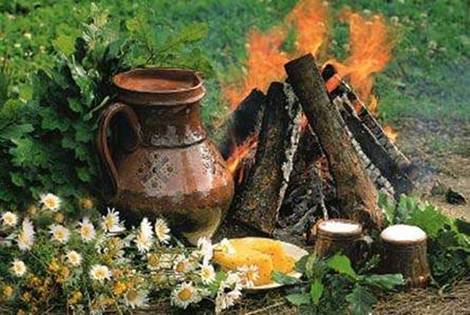
The holiday, in fact, is not the Midsummer Day, June 24, but the evening and night preceding it. The holiday coincides with the summer solstice. At the beginning of the 20th century it was observed all over Lithuania, now it is more popular in the northern and central parts of the country. Although St. John the Baptist occupies a very important place in the hierarchy of saints, the Church does not attach any great importance to the celebration of his nativity, which falls on the Midsummer Day. It is a festival of simple people, connected with the veneration of fire. Young girls adorn their heads with flower wreaths. A tall pole with a wooden wheel soaked in tar or filled with birch bark is hoisted at the top of the highest hill in the vicinity. Men whose names are Jonas (John) set the wheels on fire and make bonfires around it. In some places a second pole is hoisted with flowers and herbs. Young people dance round the fire, sing songs about rye, play games, men try to jump over the fire. The burning wheels on the poles are rolled down the hill into a river or a lake at its foot, men jumping over it all along. On the Midsummer Day people weed the rye and burn all the weeds.
On Midsummer Day's morning witches acquire special powers, they drag towels over the dewy grass to affect cows' milk. To save their cows from the witches' magic farmers shut them in cowsheds for the Midsummer Night and stick bunches of nettle in the door to scare the witches away. On Midsummer Day cows are driven out to pasture in the early after- noon when there is no more dew on the grass. Horses, however, are left to graze in the open throughout the night, or the witches magic has no effect on them.
On Midsummer Day dew has special healing powers. Young girls wash their faces in it to make themselves beautiful, older people do the same to make themselves younger. It is good to walk barefoot in dew on Midsummer Day's morning, for it saves the skin from getting chapped.
- Bookmark :
- Digg
- del.icio.us
- Stumbleupon
- Redit it
- Posted by - (0) Comment
I love Lithuanian girls!

I let Giedrė Jotautaitė represent the thousands of beautiful Lithuanian girls and women who are not only well-formed by nature, but also do their utmost to keep
their bodies in shape through proper diet, moderate use of alcohol and regular exercise. Many of these girls know very well how to dress and behave, and
they are fully on a par with their male parallels in terms of intelligence and
ability to cope with challenges at work and on a more general basis.
Lithuanian girls are at the very top in the world, in every way!
By Aage Myhre, editor-in-chief
aage.myhre@VilNews.com
I've been back home in Norway for a few days. I chose to drive this time, and travelled via Riga by ferry to Stockholm in Sweden from where I drove on to Oslo in Norway. On the ferry ride back to Riga, I discovered quickly that Swedish high school students filled most of the ship. Graduation was to be celebrated and this was done with good help of huge quantities of cheap Baltic booze aboard the ferry, the whole night through.
I have little against young people dancing the night away in a rollicking party when they have something as big to celebrate as a final exam. However, what frightened me was to see that far more than half of the adolescents were overweight and apparently had done little, in the course of growing up, to keep in shape. Swedish girls who in the 1950s, 60's and 70's were world renowned for their stunning, sexy looks, seem now to have been replaced by fattish, inelegant girls who also do not care much about how they dress or behave. The boys are no better.
What a contrast it was to get back to Vilnius, sit down on a sunny sidewalk café and study the endless stream of beautiful, slim Lithuanian girls who walked by. Like sitting in the front row of the catwalk for a perpetual Miss World show...
Lithuanian girls have good reason to be proud of themselves and the nation of Lithuania has very good reason to be proud of its magnificent girls and women...
I sincerely hope that young girls from Lithuania do not go into the same trap as so many sisters in the west have already done. Obesity, alcohol and unhealthy habits have unfortunately become a hallmark for many young people in Europe of today.
The development is anything but merry, but luckily the girls from Lithuania show the way for those who want to return to the beautiful, healthy feminine ideals...
|
Giedrė is a huge fan of VilNews! |
||
|
- Bookmark :
- Digg
- del.icio.us
- Stumbleupon
- Redit it
- Posted by - (0) Comment
Overconsumption of alcohol destroys the lives of more and more young people in Europe
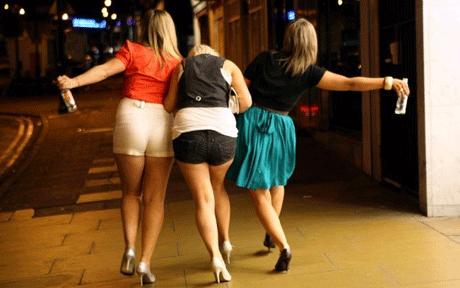
British teenage girls are starting to drink alcohol at the average age of 13,
a new study shows according to The Telegraph. Photo: Christopher Pledger
According to The Telegraph, British researchers have found that today's teenagers start drinking an average of two years younger than women who are now in their mid-twenties did, with most admitting that they had drunk alcohol by the age of 13 or 14.
It is to assume that similar figures apply to many other countries in Europe.
Drinking from a younger age leads teenagers to go on to consume alcohol more heavily, the study also found.
Doctors warn that changes in drinking habits are leading to a rapid rise in the number of young individuals with liver problems.
They say that they are seeing increasing numbers of women in their 20s and 30s with cirrhosis of the liver, a disease virtually unheard of in that age group a decade ago.
A report by a Government watchdog warns that 10 million people in Britain are now drinking at "hazardous" levels.
RELATED ARTICLE
Girls of today are 'stressed, drunk and discriminated against', report finds
Doctors have warned that more people die from alcohol than breast cancer, cervical cancer and MRSA, the hospital superbug, combined.
- Bookmark :
- Digg
- del.icio.us
- Stumbleupon
- Redit it
- Posted by - (0) Comment
Is there a future
for VilNews?
 |
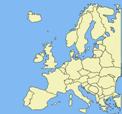 |
|
There will be no updates of VilNews e-magazine for
the period 9 – 22 June 2012.
By Aage Myhre, VilNews Editor-in-Chief
aage.myhre@VilNews.com
It seems, unfortunately, that we may have to stop publishing VilNews later this summerdue to lack of economic support and advertising from Lithuanian State, businesses and organizations, this despite the tremendous success we have had when it comes to worldwide readership and general interest.
Ideas and suggestions from you, dear readers who wouldn’t like to see this happen, would be very much appreciated.
When we went online with VilNews 16 months ago, the internet experts predicted that a ‘niche product’ like ours would probably attract no more than 10-15,000 readers per year. Today this is the number of readers we have per week (!), and we have till now welcomed close to 400,000 visitors from 181 countries; a tremendous success both with regards to readership and the great response we have had from Lithuanians and others from literally every corner of the globe. As far as I know, we are now the largest online publication from and about Lithuania in the world…
I have been told that we have more readers than all Lithuanian tourist brochures and presentations altogether.
I have been told that we have been doing more to connect global Lithuanians than all governmental institutions together…
If VilNews was printed on paper it would become a book of 7,000 pages, thicker than the Bible, making it the world’s largest and most comprehensive collection of, and source for, historical and contemporary information about the nation called Lithuania. This does, however, not impress the country’s State leaders or businesses.
When we have asked companies and the State authorities for economic support, the answer is either NO, or we get no answer at all (which is the most common ‘response’).
So far, we, the owners/shareholders, have subsidized the publishing, but I’m afraid our general meeting later this summer will be negative to do this much longer.
I think it would be sad if this enormous collection of Lithuania-related information would be lost, and I think it would be a sad day for our many readers who no longer will be getting their daily manna and access to a freestanding, democratic communication platform for good debates and the sharing of thoughts, memories and much more.
It would almost be like burning down a national library, wouldn’t it?
- Bookmark :
- Digg
- del.icio.us
- Stumbleupon
- Redit it
- Posted by - (0) Comment
In the early 1990s Algirdas Brazauskas lectured the international body
of economists and management specialists that the Soviet system was
an equally good alternative to any Western market economy…
To continue the Soviet-style thinking, is to lose Lithuania as a country

Valdas Samonis
Opinion: Valdas Samonis
With no anti-Soviet lustration, the former Soviet communist nomenklatura returned to power in LT in 1992. They started running a "tight Soviet ship" (LT needs experience in government, they argued; and we know what kind of "experience" communists had) and no Western "contaminated" professionals needed to apply for government, academia or even business positions. For just one example of the communist purge: with no notice or explanation, I was thrown out of a scholarly reviewer function at LT Science Fund (Mokslo ir studiju fondas) when a Brazauskas comrade found out that I had such a "bad" anti-Soviet past.
At one international conference at Vilnius University, a former communist party first secretary Mr. A. Brazauskas lectured the international body of economists and management specialists that the Soviet system was an equally good alternative to any Western market economy and the Soviet system brought obviously great achievements to the LT people. I left that conference early not being able to cope with my shame (as a Lithuanian) before my distinguished international colleagues!
Under the unrelenting nomenklatura propaganda, that is how Western Lithuanians started being shunned by LT people. I personally know most of those in diaspora who tried to do something good for LT in LT in the last over 20 years; almost all of them (except President Adamkus) left LT in disgust and returned to their Western countries!
Don't Come Back to LT! You will Steal my Job!
As a Soviet legacy, most LT people subscribe to the "lump of labor" fallacy, as the economic jargon has it: allegedly there is a limited and unchangeable number of jobs in the economy and you have to fight others to get your job in this zero sum game.
If you, a Lithuanian from the West, come from abroad (either in physical or digital way or both), you will steal at least part of my job, so I will do everything that you do not come from abroad to work for LT. Stretching this "Soviet logic" to the very end, the last man to leave LT is in the best situation: all jobs are available to him/her. The trouble is that this job is very specialized: turning off all the lights in LT:)
As a Soviet legacy, most LT people do not yet understand that most jobs are created not via the communist party or other official agency decree but via the interaction of people in innovative processes in both the private and public sectors, the more diverse and intensive the interaction, the better the job creation, in LT for LT people!
To continue the Soviet-style thinking, is to loose LT as a country. Nobody will wait for change much longer.
Tertium non datur.
- Bookmark :
- Digg
- del.icio.us
- Stumbleupon
- Redit it
- Posted by - (0) Comment
Ars longa, vita brevis
Art is long, Life is short.
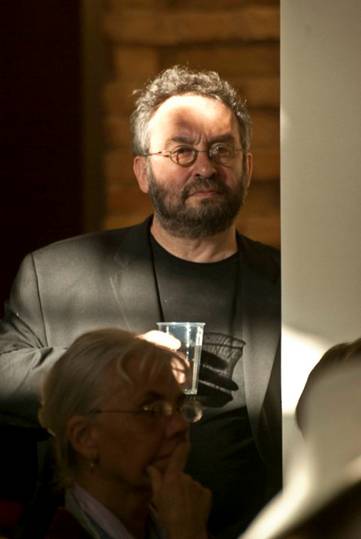
Professor of Creative Writing and American Short Story at Concordia University, Canada, the founder and main organizer of the SLS, and author Mikhail Iossel.
Photo: Kestutis Pleita
Professor Mikhail Iossel interviewed by Eglė Kačkutė
This summer, July 15-28 and August 29-12, the 14th edition of Summer Literary Festivals known as the SLS will be held in Vilnius for the 3rd time running. Literary workshops will be conducted by experienced and well known North American writers; famous photographers, artists and researchers will be taking part in the program. SLS is the biggest independent creative writing program in the world that brings together an impressive number of talented teachers and writers to be. The creative writing phenomenon is rife in Europe, too. The first British Creative Writing course graduate in the UK is legendary Ian McEwan who continues to reap the plentiful fruit of his studies at East Anglia University thirty odd years ago. Creative studies are known to be more that just a means to get better at writing, they also serve as an initiation into complex and competitive world of publishing, providing writers to be with much needed references.
Eglė Kačkutė is talking to professor of Creative Writing and American Short Story at Concordia University, Canada, the founder and main organizer of the SLS, and author Mikhail Iossel.
- Bookmark :
- Digg
- del.icio.us
- Stumbleupon
- Redit it
- Posted by - (0) Comment
If Lithuania gets its house
in order it will become a
wonderful country
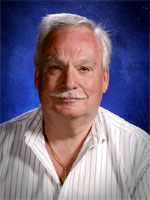
Kęstutis J. Eidukonis
Opinion: Kestutis J. Eidukonis, LTC USAR (ret)
As an experienced former Military FAO (Foreign Area Officer) I would like to make the following observations on the state of economic, political and social affairs in Lithuania. I have been coming here since 1992 and spend considerable time living here and observing the population, politics, social and economic situation in the country. I spend my time living in Vilnius and out in the countryside near Uzuguostis where I have gotten a priceless education on the views of the "kaimiečiai". I have family and friends in Klaipeda, Kaunas and Panevezys, I have talked to numerous Lithuanians who have emigrated to the US and other countries. I have a great love for Lithuania and its people and carry dual citizenship and firmly believe that if Lithuania gets its house in order it will become a wonderful country to live in. Its citizens will stop fleeing the country and actually start returning. But before this can occur we have to identify and solve some major problems.
1. The country is overtaxed
2. Because of these high taxes most small firms and individuals in Lithuania cheat and lie
3. One cannot hold accountable the various organs of government either
4. The lack of accountability in the government.
5. We have adapted all the bad attributes of Greece
It is fine to find fault and criticize, but ultimately we need to find solutions for our problems. Lets analyze our strengths and overcome our weaknesses.
1. Lithuanian's geographic location has been one source of our misfortune.
2. We need to become energy independent.
3. We need to keep the Litas - do not adopt the Euro.
4. Cut the size of Government.
5. Re-constitute the government to be incorruptible, functional and accountable.
6. Cap all corporate and private income tax at 5%
7. Lithuania should have only one tax
8. Privatize the Social Security system aka Chile.
9. Make available private Health Insurance for the upcoming generation.
10. Root out corrupt individuals from all branches of government
11. Reeducate the citizenry and youth in citizenship, patriotism and the judeo-christian ethics.
- Bookmark :
- Digg
- del.icio.us
- Stumbleupon
- Redit it
- Posted by - (0) Comment
The medals of
Petras Rimsa
Lithuanian medallic art is an especially interesting area of study in the numismatic hobby. Individual medals struck by various persons or groups convey the specifics of the history of Lithuania and its people.
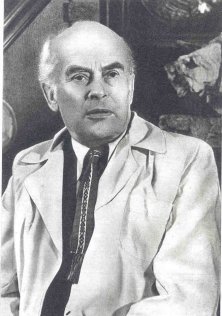
Petras Rimsa in 1957
By Frank Passic, Albion, Michigan
Lithuania’s most outstanding medalist was sculptor Petras Rimsa (1881-1961), a contemporary of Germany’s medalist Karl Goetz. Many of Rimsa’s designs reflect Lithuania’s patriotic themes and range from religious subject matter to sarcastic political commentary. Since the reestablishment of Lithuanian independence in the 1990s, Rimsa’s medals have again become popular and highly sought after by Lithuanian collectors. To meet the demand, there are even contemporary reproductions of Rimsa’s early 20th century medals.
- Bookmark :
- Digg
- del.icio.us
- Stumbleupon
- Redit it
- Posted by - (0) Comment

SOUTH AFRICAN EMBASSY
Wathint' abafazi, wathint'
imbokodo; uzokufa!
(If you strike a woman you strike a rock, and you will die!)
A saying from South Africa during the darkest days of the nation’s oppression.

Ambassador of South Africa to Denmark and Lithuania,
H.E., Ms. Samkelisiwe I. Mhlanga
Speech by Ambassador of South Africa to Denmark and Lithuania, Samkelisiwe I. Mhlanga, at the soon-to-open Crisis Centre for Women in Klaipeda
I would like to thank you for the honour of allowing us to pay a short visit to this inspiring centre you are establishing here in Klaipeda. I would like to commend the community leaders of Klaipeda for your insight and your hard work and I would like to wish you well with all your future planning and efforts. I would also like to express my admiration to the employees of the centre. These are the people who accepted the calling to fight abuse every day of their lives. Ladies and Gentleman, we admire you.
As South African’s we are humbled to be here, as the life stories we have heard and witnessed today in this place, cannot but remind us of the hardships and suffering of the women of our own country. It should also remind us that no nation on earth should claim to be completely free if the vulnerable members of its society continue to suffer abuse, injustice and discrimination.
Ladies and Gentlemen, I come from a continent whose history is filled with colonialisation and oppression that brought with it unmentionable hardship. I come from a country where a racist regime governed for 5 decades and passed laws that kept a country in bondage and cost the lives of thousands of its citizens.
In general, all racial and ethnic groups in South Africa have long-standing beliefs concerning gender roles, and most are based on the premise that women are less important, or less deserving of power, than men. Most African traditional social organizations are male centered and male dominated. Even today, in some rural areas of South Africa, for example, wives walk a few paces behind their husbands in keeping with traditional practices.
But Ladies and Gentlemen, things are changing in my country. Twentieth-century economic and political developments presented South African women with both new obstacles and new opportunities to wield influence.

Ambassador Samkelisiwe I. Mhlanga and Political Councellor Douw GJ Vermaak from the South African Embassy in Copenhagen were at the soon-to-open Crisis Centre for Women in Klaipeda last week, Here discussing the topic of violence against women with Klaipeda’s Mayor, Vytautas Grubliauskas (left)
and the staff of the Municipality’s social department.
- Bookmark :
- Digg
- del.icio.us
- Stumbleupon
- Redit it

The new generations are leaving the country in droves and very few from the country's diaspora groups plan to come home to contribute to the reconstruction of this once fine and proud country.
Our series of articles through April and May has revealed enormous discrepancies between Lithuania's current leadership and the large group of Lithuanians living outside their homeland.
It is assumed that the country's best educated and economically active segment of the population now lives in Western Europe, the USA and sometimes other countries, but that today's leaders do not do much to reach out to them, start the kind of communication that is necessary to get this country on its feet again.
Obviously, this is tragic. All Lithuanians love their homeland, but feel that the government and the leadership generally do little to facilitate for the country to grow healthy and successful.
Meanwhile, the young, non corrupt professionals are very reluctant to assume political office. "We do not want to stick your hand into this overgrown wasp's nest," we have heard several say. The result is that the new generations are leaving the country in droves and that very few from the country's diaspora groups plan to come home to contribute to the reconstruction of this once fine and proud country.
We proposed a few days ago that Lithuanians outside their home country should start coming back home to contribute to new growth and better living conditions here. These are some of the responses we have recorded.
----------------------------------------------------------------------------------------------------------------------

Viktorija Ruškulienė
Once only corrupt government and retired elderly are left, Lithuania's economy will reach the very bottom and push itself up
Once only corrupt government and retired elderly are left, Lithuania's economy will reach the very bottom and push itself up: things will start to change, hopefully for the better. As there will be no one to be robbed, the ex-KGB-today-"democratically"-elected-mob-government will follow the path of their foreign invested funds and retire outside of Lithuania. Hopefully there still will be some Lithuanians willing to return back to their homeland...
Some more realistic politicians suggest to open Lithuanian job market for Belarus young professionals and political refugees, with a promise of European citizenship after 7 years working and paying taxes in Lithuania. This will become some "injection" to keep economy floating at the level it is today, but what will happen if Belarus elects new government and joins EU? Will people from Asia's developing countries be interested in cold climate and hopeless economy refuge?
Lithuania loves money, sent by expatriates, though...
----------------------------------------------------------------------------------------------------------------------

Grant Gochin
Lithuania does NOT love the expatriate community. If the country of Lithuania rejects us, why maintain our Lithuanian identity?
Lithuania does NOT love the expatriate community. Rather, LT does EVERYTHING possible to reject them. Loyalty has to work both ways. The days of the state being a slave-master and the citizens being mindless obedient drones are over.
If the country of Lithuania rejects us, why maintain our Lithuanian identity?
The people have to protest. If nobody does, nothing will improve.
- Bookmark :
- Digg
- del.icio.us
- Stumbleupon
- Redit it
- Posted by - (0) Comment
Need some peace of mind?
Try a boat trip on the
Nemunas and a spa visit
to beautiful Birštonas!
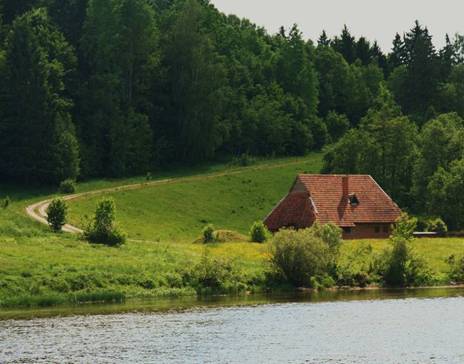
An old house on the Nemunas river bank near Birštonas
Text and photos: Aage Myhre
aage.myhre@VilNews.com
Lithuania’s largest river, the Nemunas, is a slow and peaceful river; with an average speed of only 1 to 2 m/s. Its total length of 937 km makes it the 14th largest river in Europe. 459 km flow in Belarus, 359 km in Lithuania. Well, we called it peaceful, but if you agree to join us for a trip to the small resort town of Birštonas, one hour’s drive from Vilnius, you will soon realise that it’s right here that Nemunas gets a bit crazy, making four large loops without any other reason than this that Birštonas needed some special attention and minerals that over the centuries has made it such an attractive spa resort. Birštonas is suitable for therapy and recreation all year round with its curative peat and mineral water used in treating chronic diseases of peripheral nervous system, gastrointestinal, respiratory and blood circulation systems. The first patients were treated in Birštonas as early as 1840. Enjoy!
Rūta Kapočinskaitė is my Birštonas heroine. She has understood what it takes to represent a tourist destination with energy and genuine attention to the visitor - much more so than representatives of the majority of destinations in this country. So, if you are a Lithuanian working in the tourist trade, don’t miss the chance to learn from Rūta. It takes enthusiasm to promote a destination, and Rūta has got plenty of exactly that. She is simply good!
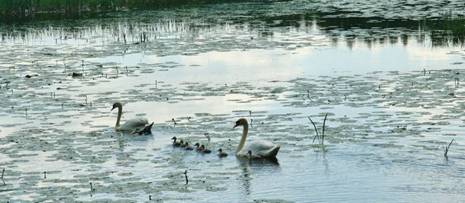
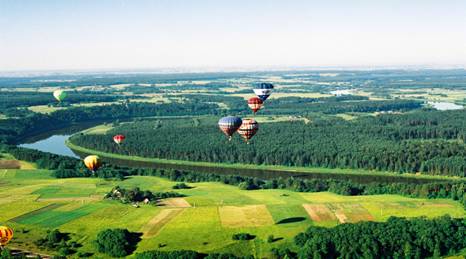
- Bookmark :
- Digg
- del.icio.us
- Stumbleupon
- Redit it
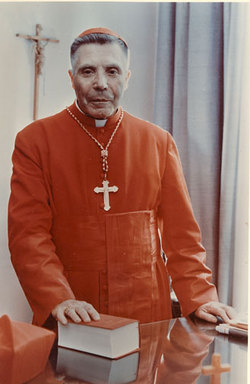
Vincentas Sladkevičius, MIC
(August 20, 1920—May 28, 2000)
Vincentas Sladkevičius, MIC (August 20, 1920—May 28, 2000) was a Lithuanian Cardinal of the Roman Catholic Church. He served as Archbishop of Kaunas from 1989 to 1996, and was elevated to the cardinalate in 1988.
Vincentas Sladkevičius was born in Žasliai, Kaišiadorys, to Mykolas Sladkevičius and his wife Uršule Kavaliauskaite. He was the youngest of five children, his siblings being named Ona, Emilija, Jonas and Marija. After studying at the Kaunas Priest Seminary and Theological Faculty in Kaunas, Sladkevičius was ordained to the priesthood on March 25, 1944. He then did pastoral work in Kaišiadorys until 1959, including serving as a professor and the prefect of studies and discipline at the Kaunas seminary.
On November 14, 1957, Sladkevičius was appointed Auxiliary Bishop sedi datus of Kaišiadorys and Titular Bishop of Abora. He received his episcopal consecration on the following December 25 from Bishop Teofilius Matulionis. However, Bishop Sladkevičius was impeded from performing his ministry by his country's Communist government, and he took up residence at Nemunėlio Radviliškis, where he was under virtual house arrest from 1963 to 1982. He was named Apostolic Administrator ad nutum Sanctae Sedis of Kaišiadorys on July 15, 1982, and became President of the Lithuanian Episcopal Conference on April 27, 1988.
Pope John Paul II created Sladkevičius Cardinal Priest of Spirito Santo alla Ferratella in the consistory of June 28, 1988, and later Archbishop of Kaunas on March 10, 1989. In 1993 the Cardinal entered the Congregation of the Marian Clerics of the Immaculate Conception. He resigned as Kaunas' archbishop on May 4, 1996, after seven years of service. He was awarded the Order of Vytautas the Great in 1998.
V. Sladkevičius died in Kaunas, at age 79. He was buried in the Cathedral-Basilica of Kaunas following a funeral Mass there on June 1, 2000.

An article by KR Slade
- Bookmark :
- Digg
- del.icio.us
- Stumbleupon
- Redit it
U.S.-Nordic-Baltic cooperation
- Posted by - (0) Comment

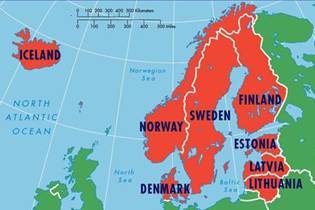
By Dr. Stasys Backaitis
 Conference on U.S.-Nordic-Baltic Cooperation:
Conference on U.S.-Nordic-Baltic Cooperation:Shaping the U.S.-European Agenda
The conference provided an overview by U.S. and European researchers and political experts on the importance, need and benefits of a close U.S. collaboration with the Nordic-Baltic region. The collaboration would facilitate building a wider and more secure Europe, reinforcing U.S. attention to transatlantic engagement, and achieving a more constructive dialog with Russia leading to democratization of its society. The conference took place on Friday, May 4, 2012, at The Paul H. Nitze School of Advanced International Studies of the John Hopkins University, Washington, D.C.
- Bookmark :
- Digg
- del.icio.us
- Stumbleupon
- Redit it
- Posted by - (0) Comment
Good morning,
Mr. President!

There is no head of state in the world, other than former President Adamkus, who has been running 100 meters in 10.8 seconds... This reveals the newly released 400 page sports biography that has been prepared by sports journalist Maryte Marcinkevičiūtė. It is early morning in May 2012. I am here to interview His Excellency, President Valdas Adamkus.
Photo: Aage Myhre.
President Valdas Adamkus interviewed by Aage Myhre
aage.myhre@VilNews.com
Former President Valdas Adamkus welcomes me in his office in the rear wing of the Presidential Palace in Vilnius Old Town this early May morning. We are approaching the end of our series on the relationship between the Lithuanian-American community and the home country, and I have come here to the ex president's office to learn more about how he, as the world's most famous Lithuanian-American, looks at this relationship. I would also like to hear more about his own history in Lithuania before and during World War II, about his years in Chicago and about his time as a politician and President of Lithuania for most of the years of 1998-2009.
I must admit that I sometimes felt Adamkus was too weak in his job as president. I often wished that he more pronouncedly had called the country's nomenclature to account for their transgressions against the nation's population, and I felt much more should have be done to fight corruption, injustice, intolerance, neglect of society's weaker groups, violence, crime and other misdeeds that Lithuania is still so tragically suffering under.
But after sitting with him for nearly two hours this morning, it slowly dawned on me how impossible it must have been to change attitudes and deeds in a country that to such a high degree had been brainwashed and subjected to almost unbelievable abuses over the years under Soviet tyranny. My respect and understanding of President Adamkus grew significantly during this interview.
- Bookmark :
- Digg
- del.icio.us
- Stumbleupon
- Redit it
- Posted by - (0) Comment
 |
VilNews is in Azerbaijan
|
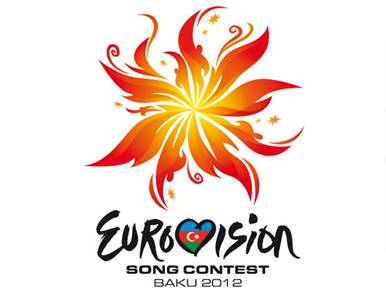
By Arvydas Arnasius
To tell frankly Azerbaijan was not on my list of countries which I wanted to go no matter what and when there was an opportunity to visit it during the 2012 Eurovision song contest in Baku I had a reserved expectations.
For the reader I can tell that Azerbaijan is neither Europe nor Asia and this country has an incredible tangle of contradictions and contrasts. It’s fascinating nexus of ancient historical empires going back centuries ago. Yet it’s also a new and dynamic nation finding its way from the emergencies from war-torn post-Soviet times on petroleum funded explosion of optimism. Surrounded by the semi-desert on the oil rich Caspian Sea, the nation’s cosmopolitan capital – Baku, is a dynamic boom-town, where flashy limousines and mushrooming skyscrapers sweep around the picturesque old town. Yet barely few hours’ drive away there is another reality - entirely different world: timeless villages with their people and soaring high Caucasus mountains.
- Bookmark :
- Digg
- del.icio.us
- Stumbleupon
- Redit it
- Posted by - (0) Comment
A wonderful May visit to:

Text and photos: Aage Myhre
aage.myhre@VilNews.com
The long pier that stretches out into the Baltic Sea is the hallmark of Palanga. It is still relatively spacey now in May, but it will soon become the crowded promenade path for intense summer evenings when the sun sets over the Baltic Sea. It is a real breakwater, struggling against the never-ending waves rolling in towards the sandy coast of Lithuania where the more than fresh breeze often does it very best to blow the sand further inland, but with the high dunes behind the beaches effectively stopping it. It is early summer in Palanga, and I simply love the freshness of the sea water, the breeze and the air that now feels healthier than ever.
In Lithuanian language the pier is called a bridge, and I am thinking that for the long years of Soviet oppression, the Palanga pier may have been like a real bridge for the people of this country, a bridge of imagination on how it would be to walk over to the Swedish shore on the other side - to the freedom and prosperity that for so many years had to be no more than a dream for the Lithuanian people.
Palanga town itself is calm and relatively quiet, perfectly well protected from the wind by the tall bowed pine trees that grow along the coast line. The leaves on the deciduous trees behind are still keeping their fantastic glowing red and yellow colours, even if many of them already have fallen to the ground, preparing to fertilise the soil for a new spring next year.
Spring in Palanga is for me even more attractive than the very summer when the huge crowds of tourists arrive here. Now I can see the beauty of the nature in a far more undisturbed way, and each breath of the wind seems now more soothing and healing.
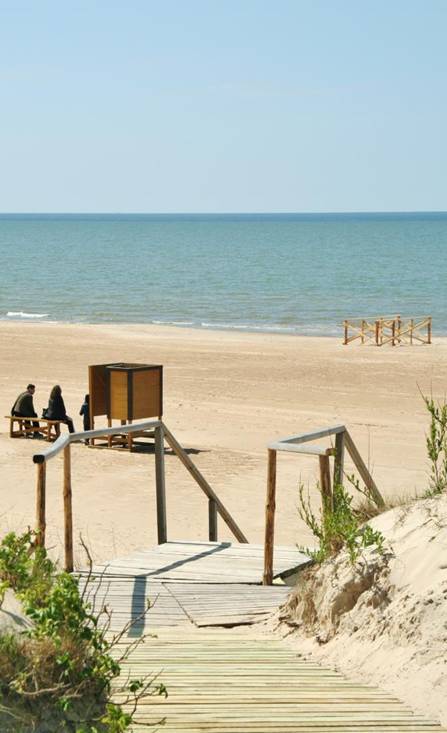
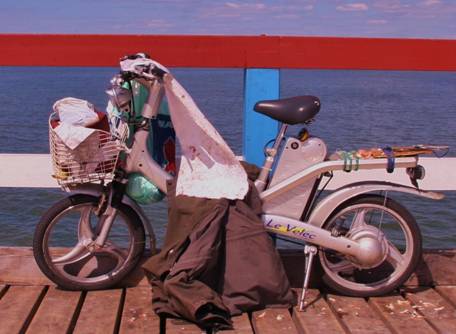
- Bookmark :
- Digg
- del.icio.us
- Stumbleupon
- Redit it
VilNews e-magazine is published in Vilnius, Lithuania. Editor-in-Chief: Mr. Aage Myhre. Inquires to the editors: editor@VilNews.com.
Code of Ethics: See Section 2 – about VilNews. VilNews is not responsible for content on external links/web pages.
HOW TO ADVERTISE IN VILNEWS.
All content is copyrighted © 2011. UAB ‘VilNews’.

 Click on the buttons to open and read each of VilNews' 18 sub-sections
Click on the buttons to open and read each of VilNews' 18 sub-sections 
















.jpg)



